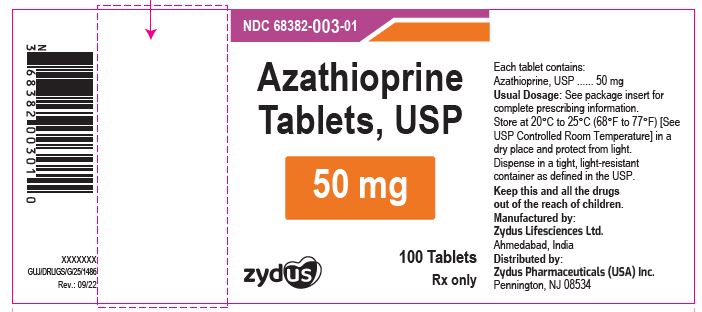Azathioprine is an immunosuppressive medication that is used to treat a variety of conditions. These include Systemic Lupus Erythematosus (SLE), inflammatory myositis, uveitis, vasculitis, inflammatory bowel disease, and rheumatoid arthritis.
By understanding how Azathioprine works within the body, we can better understand its potential benefits and risks.
It’s important to note that while this drug has been effective in treating these conditions, it should only be used under the guidance of a healthcare professional for safety reasons.
What is Azathioprine used for?

Azathioprine is a key treatment for managing autoimmune conditions, where the body’s immune system mistakenly attacks its own tissues. It plays a specific role in each condition:
Systemic Lupus Erythematosus (SLE)
This complex autoimmune disease can affect multiple organ systems. Azathioprine helps to dampen the overactive immune response, reducing symptoms like joint pain and skin rashes.
Inflammatory Myositis
Characterized by muscle inflammation and weakness, Azathioprine aids in suppressing aberrant immune activity, thereby helping to improve muscle strength and function.
Uveitis
An inflammatory condition of the eye, Azathioprine can play a role in controlling ocular inflammation and preventing vision loss.
Vasculitis
In conditions causing inflamed blood vessels, Azathioprine helps to reduce inflammation, preserving organ function by limiting damage to blood vessel walls.
Inflammatory Bowel Disease
Including Crohn’s disease and ulcerative colitis, Azathioprine assists in reducing gastrointestinal inflammation, leading to symptom remission and decreased flare-ups.
Read More: Did You Know About These Reliable Crohn’s Disease Treatments?
Rheumatoid Arthritis
Used to control joint inflammation and damage, Azathioprine can enhance quality of life by alleviating chronic pain and swelling.
Supported by research findings, Azathioprine has demonstrated efficacy in these conditions by helping patients achieve better disease control and symptom management. Regular monitoring and adjustments in therapy are critical to maximizing benefits while minimizing risks.
Understanding Azathioprine: Forms, Dosage, and Administration
Azathioprine is available in two forms: tablets and injectables.
The azathioprine tablet(s) are commonly prescribed and taken orally, while the injectable form is usually reserved for hospital settings.
The appropriate dosage of azathioprine varies greatly depending on the medical condition being treated, the patient’s weight, and their overall health status. Your doctor will personalize your dosage based on these factors.
To ensure optimal disease control, it’s essential to take azathioprine at regular intervals as directed by your healthcare provider. Treatment duration also depends on your individual health situation and response to therapy.
Remember that every patient is unique; what works for one may not work for another.
Always refer to your azathioprine medication information leaflet for specific instructions on how to take azathioprine.
What should I do if I forget to take/use Azathioprine?
A common concern when managing a medication regimen is what to do if you miss a dose. With Azathioprine, it’s important to remember that being consistent helps maintain the right amount of the drug in your body.
If you forget to take a dose:
- Don’t panic. It’s normal to occasionally miss a dose.
- Don’t take extra. Taking more medication than prescribed to make up for the missed dose can be dangerous.
- If it’s close to the time for your next scheduled dose, skip the missed dose and continue with your regular dosing schedule.
- If it’s not close to your next dose, take the missed dose as soon as you remember.
Always talk to your healthcare provider or pharmacist for personalized advice. Remember that taking medications correctly plays a role in improving your health!
Managing Side Effects and Risks Associated with Azathioprine Use
Azathioprine is a strong medication that can cause various side effects. It’s important to address these side effects promptly and manage them carefully. If you’re taking azathioprine, make sure to:
- Report any of the following symptoms to your healthcare provider right away:
- Unusual bruising or bleeding
- Signs of infection (such as fever or sore throat)
- Severe nausea or vomiting
- Yellowing of the skin or eyes (jaundice)
- Severe abdominal pain
- Undergo regular blood tests to monitor how azathioprine is affecting your body, especially your bone marrow function and liver enzymes.
- Follow the prescribed dosage information for azathioprine.
- Take necessary precautions when using azathioprine, such as avoiding exposure to sunlight without protection and practicing good hygiene to prevent infections.
Thus, by being aware of the potential side effects and risks associated with azathioprine, you can take proactive measures to minimize them. Remember, early detection and intervention are key in preventing severe complications.
Potential Interactions with Other Medications and Substances
When taking Azathioprine, it’s crucial to be aware of its potential interactions with other medications, which could result in increased side effects or reduced efficacy of treatment. Specifically:
- Corticosteroids: Often prescribed concurrently with Azathioprine for inflammatory conditions, their combination requires careful monitoring to manage the risk of excessive immunosuppression.
- NSAIDs (Nonsteroidal anti-inflammatory drugs): These may increase the risk of kidney issues when used with Azathioprine.
- DMARDs (Disease-modifying antirheumatic drugs): Combining DMARDs with Azathioprine might enhance therapeutic effects but also raises the risk of liver enzyme abnormalities and bone marrow suppression.
To maintain safety and effectiveness:
- Avoid allopurinol as it can escalate Azathioprine’s toxicity.
- Monitor warfarin closely since Azathioprine can amplify its blood-thinning effect.
- Refrain from consuming grapefruit juice; it can alter enzyme activity affecting how Azathioprine is metabolized.
- Limit exposure to sun and UV light due to potential skin reaction enhancement.
Take note that this list isn’t exhaustive. Always discuss any new or existing medications with your healthcare provider.
How should I store Azathioprine?
Storing Azathioprine properly is essential to maintain its effectiveness and safety. Here are some guidelines to follow:
- Store at room temperature: Keep Azathioprine in a cool, dry place where the temperature stays between 15°C and 30°C. Avoid storing it in places with high humidity like bathrooms or near kitchen sinks.
- Keep out of reach of children and pets: This medication can be harmful if swallowed by someone it was not prescribed for. Always store it in a secure location.
- Stay away from light and heat: Direct sunlight and heat can degrade Azathioprine, reducing its potency. Don’t store it near windows or heaters.
Disposing of unused or expired medication safely is just as important as correct storage. Here’s what you need to do:
- Don’t flush or pour them down the drain: Unless instructed by your healthcare professional, avoid this method of disposal as it can harm the environment.
- Use medicine take-back programs: Many pharmacies offer take-back programs where they handle the safe disposal of medications for you.
- Follow specific disposal instructions on the drug label or patient information leaflet, if available. When in doubt, consult your pharmacist or local waste disposal company.
Please remember that the above guidelines are general advice and may not apply to all situations or conditions. Always consult your pharmacist or healthcare provider for more accurate information about storing and disposing of Azathioprine.
Azathioprine and Pregnancy
When it comes to Azathioprine and pregnancy, there are two important things to think about:
Risks during Pregnancy
Azathioprine can be harmful to a developing baby. It may cause birth defects or other problems with how the baby grows. Because of this, women who are pregnant or planning to get pregnant should only take Azathioprine if the possible benefits outweigh the risks.
Contraception and Consultation
If you’re a woman who can have children and you’re taking Azathioprine, it’s very important to use birth control to avoid getting pregnant by accident. You should also talk to your doctor about your situation. They can give you advice that fits your needs. This way, you can manage any health issues you have while also protecting your baby from potential harm caused by the medication.
By talking about these concerns with a healthcare provider, you can make sure that any decisions about treatment are based on what’s best for both you and your baby.
Read More: Amisulpride: What is it and What you need to Know


